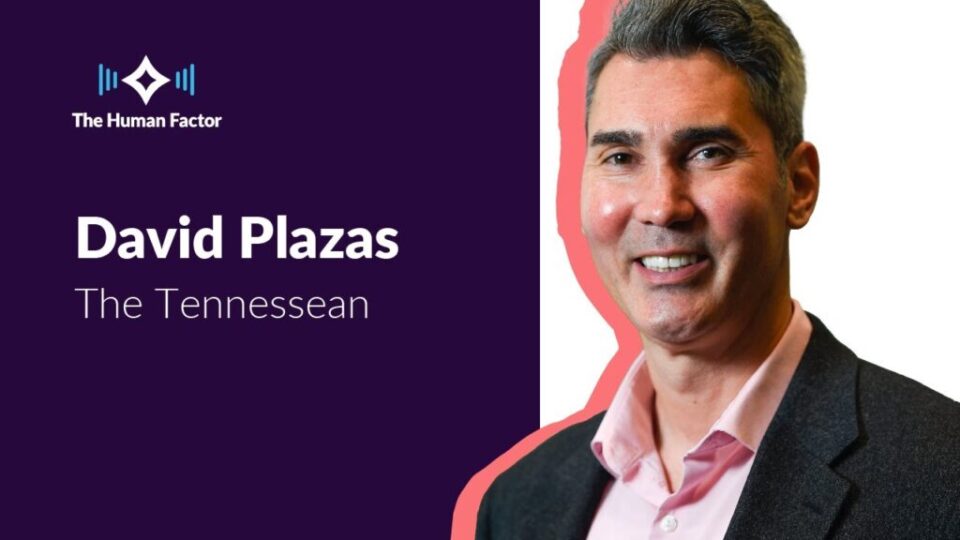Challenge to Gannett Provides Legal Opportunity
Journalists’ Toll Rises; At Least 2 Cartoons Pulled
Reporter Awarded $700,000 After Sheriff’s Abuse
Maria Reeve Leaves Texas to Return to Star Tribune
Pulitzer-Winning ‘George Floyd’ Called Too ‘Adult’
NAHJ Nets $480,000 From Summer Convention
Short Takes: NBC News and Republican debate; what Trump gets away with; census projections for end of century; mayor-elect Lily Wu; Urban One’s losing vote on casino; Merrill Brown; F.L. “Bubba” Copeland, mayor and cross-dresser; Keith Richburg; blocked Black-owned media companies; Loren Ghiglione; season two of PBS’ ‘Native America’;
Investigative Reporters and Editors’ “The Indigenous Issue”; a “reporting fellow for reparations narratives”; Alexis Rogers; how public media might be included in Press Forward; Hawaii’s Japanese-American journals; Philippines journalist gunned down on air.
Support Journal-ismsDonations are tax-deductible.
David Plazas, director of opinion and engagement for the USA Today Network Tennessee and an editorial board member of the Gannett-owned Tennessean in Nashville, discusses Gannett’s diversity, equity and inclusion practices. (Credit: YouTube)
Challenge to Gannett Provides Legal Opportunity
A white male journalist’s proposed class-action suit against the Gannett Co. provides an opportunity for media companies and associations to step up to the plate — in court — on diversity.
The journalist, Steven Bradley, argues that he and others were passed over in favor of journalists of color so that Gannett could implement its diversity, equity and inclusion goals.
As Taylor Telford reported Nov. 4 for The Washington Post, Bradley, 56, “is one of five named plaintiffs in a proposed class-action lawsuit that claims the country’s largest newspaper publisher ‘discriminated against non-minorities’ to achieve diversity goals. Filed in August in Virginia federal court, the suit alleges that Gannett fired White employees, denied them opportunities for advancement and replaced them with less-qualified minority candidates as the company sought to diversify its workforce.”
The lawsuit against Gannett was filed by Bradley in New York state Supreme Court in Rochester, N.Y., in April. Bradley worked for the Gannett-owned Democrat and Chronicle in Rochester for 21 years beginning in 1999, as this column reported in June.
However, that suit was withdrawn with a “stipulation of voluntary discontinuance” without prejudice, the Monroe County, N.Y., clerk’s office told Journal-isms last week.
 Apparently, Bradley (pictured) and his team decided to broaden the suit by including four others, by clearly making it national, and by moving the venue to the U.S. District Court’s Eastern District of Virginia, which includes Gannett’s headquarters in Fairfax County.
Apparently, Bradley (pictured) and his team decided to broaden the suit by including four others, by clearly making it national, and by moving the venue to the U.S. District Court’s Eastern District of Virginia, which includes Gannett’s headquarters in Fairfax County.
Bradley referred questions to his lawyer, J. Nelson Thomas, who did not respond to inquiries. Nor did Gannett, although Polly Grunfeld Sack, Gannett’s chief legal counsel, messaged the Post, and earlier Fox News, “We will vigorously defend our practice of ensuring equal opportunities for all our valued employees against this meritless lawsuit.”
The lawsuit has broad implications. As Telford pointed out, “The case is among the first to test the legality of corporate diversity practices in the wake of a June Supreme Court ruling that struck down affirmative action in college admissions. That decision has sparked a wave of litigation aimed at racial considerations in the workplace, including claims that corporate efforts to increase diversity have disadvantaged White employees.”
Ironically, as Julian Mark reported for the Post on Nov. 6, ” A law that helped end slavery is now a weapon to end affirmative action,” as the headline read.
Congress passed the Civil Rights Act of 1866 to establish citizenship for newly emancipated enslaved people, Mark wrote.
“Legal scholars say the lawsuits citing the 1866 Civil Rights Act — as well as those that reference Title VII of 1964 Civil Rights Act — have a strong chance of eliminating race-conscious programs in the private sector.
“ ‘The lawsuits are aimed at wiping out any vestiges of what we call affirmative action in employment,’ said Susan Carle, a law professor at American University and an expert in Reconstruction-era history. The law is being used because it carries a ‘constitutional overtone’ that could ripple into other areas of the law that protect private-sector affirmative action and DEI programs, she said, adding: ‘I very much fear that they will prevail.’
 In April, Forbes recognized as Gannett as one of the publication’s 2023 Best Employers for Diversity, ranking 214 among the 500 companies that were surveyed. “This honor reflects Gannett’s continued commitment to inclusion, diversity, and equity,” Gannett said. The company also received the award in 2020 and 2021.
In April, Forbes recognized as Gannett as one of the publication’s 2023 Best Employers for Diversity, ranking 214 among the 500 companies that were surveyed. “This honor reflects Gannett’s continued commitment to inclusion, diversity, and equity,” Gannett said. The company also received the award in 2020 and 2021.
Here’s where the legal opportunity comes. Journal-isms has reached out to the News Media Alliance, which represents publishers; the News Leaders Association, editors; and to the National Association of Black Journalists, all of whom profess support for diversity, to determine whether there is interest in joining the case as friends of the court, or amicus curiae.
“No comment yet,” NABJ President Ken Lemon messaged Sunday. “We are aware of the situation and are closely monitoring it.”
Such briefs “essentially show the court that its final decision will impact people other than the parties,” according to the law firm Smith Gambrell Russell.
“The groups most likely to file amicus briefs are businesses, academics, government entities, non-profits and trade associations.”
The Society of Professional Journalists, through its Legal Defense Fund, has a wealth of briefs, advocacy letters and statements in which it has weighed in over the years, and lists them here [PDF].
Likewise, the Reporters Committee for Freedom of the Press joined with the American Society of Newspaper Editors, predecessor of the News Leaders Association, and the Association of Alternative Newsweeklies, to submit a friend-of-the-court brief in a First Amendment case, one of many filed by the Committee.
The National Association of Black Journalists joined legal cases at least twice in the 1990s. NABJ filed an amicus brief decrying First Amendment violations in the case of activist and journalist Mumia Abu-Jamal, who for nearly 40 years has been seeking to overturn his murder conviction in the fatal shooting of Police Officer Daniel Faulkner.
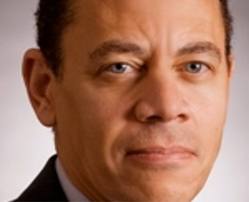 Also, in 1998, according to Wayne Dawkins’ “Rugged Waters: Black Journalists Swim the Mainstream,” the association “agreed to file a friend-of-the-court brief in support of the Federal Communications Commission appeal of a federal court decision to eliminate equal employment opportunity hiring rules for broadcast journalism.
Also, in 1998, according to Wayne Dawkins’ “Rugged Waters: Black Journalists Swim the Mainstream,” the association “agreed to file a friend-of-the-court brief in support of the Federal Communications Commission appeal of a federal court decision to eliminate equal employment opportunity hiring rules for broadcast journalism.
” ‘Diversity in America is under legal assault,’ Federal Communications Commission Chairman William Kennard (pictured, above) told NABJ members at the July 30 newsmaker luncheon,” Dawkins wrote. ” ‘African Americans bring a unique perspective (to broadcast coverage). I bring that unique perspective to the FCC. It matters because race matters. ‘ “
- Susan Harmeling, Ph.D., Forbes: Balancing Diversity And Meritocracy: The Gannett DEI Lawsuit
- Lawyers Committee for Civil Rights Under Law: Lawyers’ Committee for Civil Rights Defends Programs Combatting Historic Racial Bias in Brief Supporting Fearless Fund LLC (Sept. 5)
On the “PBS NewsHour,” co-anchor Amna Nawaz speaks with Jodie Ginsberg, president of the Committee to Protect Journalists about the deadliest four weeks for journalists in more than three decades. (Credit: YouTube)
Journalists’ Toll Rises; At Least 2 Cartoons Pulled
As the death toll among journalists rises along with that for everyday Israelis and Palestinians, and media coverage takes greater account of humanitarian concerns, some cartoons about the war are facing stiff headwinds. Israeli politicians, prompted by unsubstantiated conjecture, called for journalists in Gaza to be killed.
In addition, more than 750 journalists signed a letter condemning Israel’s killing of reporters in Gaza and criticizing Western media coverage.
“The letter — which said newsrooms are ‘accountable for dehumanizing rhetoric that has served to justify ethnic cleansing of Palestinians’ — is the latest in a string of impassioned collective statements staking out ground in the stateside reaction to the Israel-Gaza war,” Laura Wagner and Will Sommer wrote Thursday for the Washington Post.
“But while other writers, artists, scholars and academics have criticized media coverage of the conflict, the latest letter — which includes signatories from Reuters, the Los Angeles Times, the Boston Globe and The Washington Post — is notable for exposing divisions and frustrations within newsrooms.
“For some of the journalists, signing the letter was a daring or even risky move. Reporters have been fired from some newsrooms for espousing public political stances that could open them to accusations of bias. . . .”
Meanwhile, the Committee to Protect Journalists said Thursday that “The Israel-Gaza war has become the deadliest month for journalists covering conflict since CPJ began documenting journalist fatalities in 1992.
“As of November 9, CPJ’s investigations showed at least 39 journalists and media workers were among an estimated 12,000 killed since the war began on October 7 — with more than 10,600 deaths in the Palestinian territories of Gaza and the West Bank and 1,400 in Israel. This deadly toll is coupled with harassment, detentions, and other reporting obstructions in Gaza, the West Bank, Israel, and beyond. . . .”
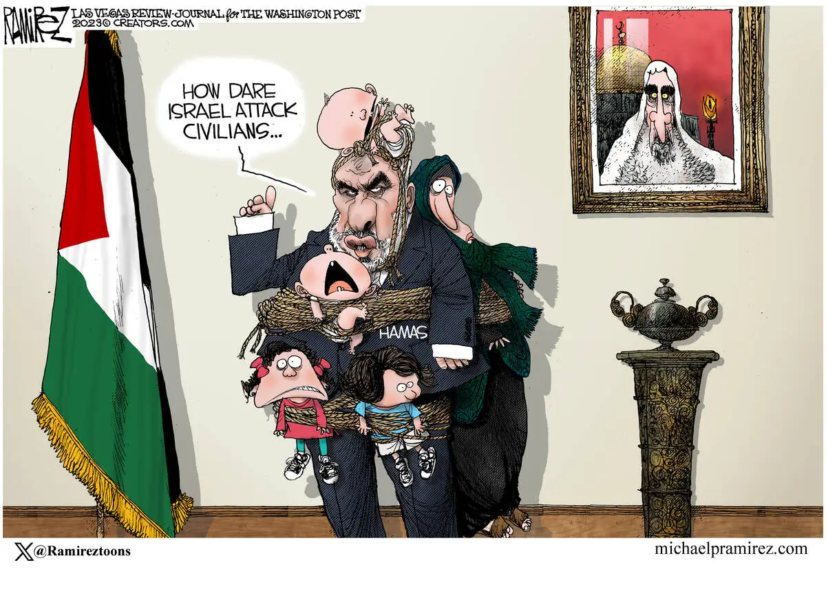
Protests from within the newsroom were cited along with reader complaints in prompting the Washington Post to remove a cartoon depicting a Hamas spokesman putting civilians in the line of fire after multiple employees inside the newsroom and readers complained that it was racist, Alexandra Bruell reported Thursday for The Wall Street Journal.
“In the cartoon, the Hamas official has a woman and children bound to his body by rope, with a baby tied to his head. He is standing next to a Palestinian flag, and in a speech bubble says, “HOW DARE ISRAEL ATTACK CIVILIANS…”
“Before the drawing was removed, a number of employees inside the Post newsroom had complained to top editors that the cartoon was racist, according to people familiar with the matter. The cartoon also drew a backlash from some readers who left comments on the Post’s website.
“ ‘The caricatures employ racial stereotypes that were offensive and disturbing,’ wrote one reader.
“Michael Ramirez, the cartoonist, didn’t immediately respond to a request for comment. . . . “

The fracas over the Ramirez cartoon follows the Guardian’s firing last month of of longtime editorial cartoonist Steve Bell after refusing to run a caricature of Israeli Prime Minister Benjamin Netanyahu that critics said drew on antisemitic imagery.
“The decision has been made not to renew Steve Bell’s contract,” the Guardian said.
“Steve Bell’s cartoons have been an important part of the Guardian over the past 40 years — we thank him and wish him all the best,” publisher Guardian News and Media said in a statement sent to The Associated Press on Thursday.
Reporters Without Borders Friday said the calls by Israeli politicians for journalists in Gaza to be killed “coincide with a disturbing amendment to Israel’s terrorism law. Targeting journalists is a war crime, RSF stresses.”
“An Israeli non-governmental organisation posted an undated photo 9 November showing a freelance photographer with a Hamas leader, and it accompanied the photo with an article questioning the photographer’s integrity and the integrity of five other reporters working for Reuters, the Associated Press, The New York Times and CNN. The article implied that journalists working in Gaza knew in advance about the Hamas attack on 7 October.
“After several Israeli media outlets reported these speculations, for which there has so far been no investigation or substantiation, the story was picked up internationally and Israeli government officials began reacting. The Israeli Foreign Ministry shared a tweet repeating the accusations and publishing photos of the journalists involved, openly putting them in danger. . . .”
- Jennifer Bowers Bahney, Mediaite: ‘My Home Has Become A Graveyard’: CNN Reporter In Gaza Gives Heartbreaking Account Of Escape To Egypt
- Kareem Fahim, Hajar Harb and Mohamad El Chamaa, Washington Post: For Gaza’s journalists, war coverage and personal grief are one story
- Diana Falzone, Mediaite: ‘I’ve Had to Change My Way of Living’: Reporters Covering Israel-Hamas War Face Violent Threats, Harassment
- Masha Gessen, the New Yorker: Inside the Israeli Crackdown on Speech
- Nico Hines, Daily Beast: Is This the Most Dangerous Job on Earth Right Now?
- Clarence Page, Chicago Tribune: President Biden adds battle against Islamophobia to his quest for peace
- Will Sommer, Washington Post: Hearst asks staff to report colleagues’ ‘controversial’ posts to management
Witnesses outside St. Francis Medical Center in Lynwood, Calif., where injured deputies are being treated, say some demonstrators gathered outside the facility and chanted anti-law enforcement phrases. Shortly after, local reporter Josie Huang was tackled and pinned to the ground by deputies and arrested. The Reporters Committee said the Los Angeles County Sheriff’s Department “made a string of false claims about her conduct that evening, including that she failed to identify herself as a journalist and ‘interfered with the arrest.’ ” (Credit: YouTube)
Reporter Awarded $700,000 After Sheriff’s Abuse
“The Los Angeles County Board of Supervisors approved a $700,000 settlement Wednesday with a local reporter who was tackled, handcuffed and arrested while covering an anti-law enforcement protest in Lynwood in 2020,” City News Service reported.
The Reporters Committee for Freedom of the Press, which helped in the negotiations, said, “The settlement — to the Reporters Committee’s knowledge, the largest award to an individual journalist whose rights were violated in connection with protest coverage in 2020 — sets a new benchmark for journalists arrested or assaulted by law enforcement. The agreement is also significant for its training requirements, intended to help prevent local law enforcement officials from unlawfully arresting and assaulting journalists in the future.
 “In addition to the $700,000 payment to [Josie] Huang (pictured), the settlement includes:
“In addition to the $700,000 payment to [Josie] Huang (pictured), the settlement includes:
A requirement that the LASD [Los Angeles County Sheriff’s Department] provide deputies with watch briefings on press rights before patrol assignments, like protests, in which they are likely to come into contact “with members of the news media; and
“A requirement that the LASD issue written guidance to all employees on the laws and policies governing their interactions with members of the news media.
The City News Service continued, “The board approved the settlement with Josie Huang unanimously and without comment. Huang was a reporter for KPCC and LAist.
“Huang was arrested Sept. 12, 2020, as she was covering a confrontation involving a handful of protesters at the emergency room entrance of St. Francis Medical Center, where two deputies who had been shot in an ambush near a Compton transit station were being treated.
“Video from the scene showed deputies pinning Huang to the ground and arresting her.
“The sheriff’s department claimed she didn’t have proper media credentials, failed to properly identify herself as a reporter and was ‘interfering with a lawful arrest’ of one of the protesters.
“Then-sheriff Alex Villanueva later accused Huang of getting ‘right up on the shoulder’ of a deputy trying to make an arrest, and said her actions were more ‘activism’ than journalism. . . .”
The committee also said of the sheriff’s department claims, “Substantial video evidence showed that those statements were false, but LASD continued to stand by them. In her recordings of the incident, Huang can be heard clearly and repeatedly telling the deputies that she was a journalist for KPCC. She was also wearing a visible press badge that identified her as a reporter.”
Maria Reeve Leaves Texas to Return to Star Tribune
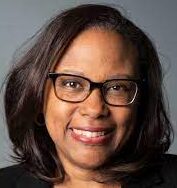 Maria Reeve (pictured), the first Black woman to become executive editor of the Houston Chronicle, then named to a newly created corporate position for Hearst Texas, is returning to the Star Tribune in Minneapolis as managing editor for daily news.
Maria Reeve (pictured), the first Black woman to become executive editor of the Houston Chronicle, then named to a newly created corporate position for Hearst Texas, is returning to the Star Tribune in Minneapolis as managing editor for daily news.
Reeve came to the Chronicle in 2021 from the Star Tribune, where she served in various roles including assistant managing editor of news, assistant features editor and deputy metro editor.
“In her leadership role, Reeve will be responsible for overseeing the Star Tribune’s daily news operations, including the new Today Desk effort focused on breaking and trending news,” the Star Tribune said in a statement. “Her work will spearhead a renewed focus for the company to provide audiences with timely, accurate and breaking news that keeps Minnesotans on the pulse of what’s happening in our state and in our communities.”
“I am beyond thrilled to be back in this newsroom and back in the Twin Cities,” Reeve said in the news release. “I’m looking forward to working with the many talented journalists across our newsroom — all with the aim of serving this community.”
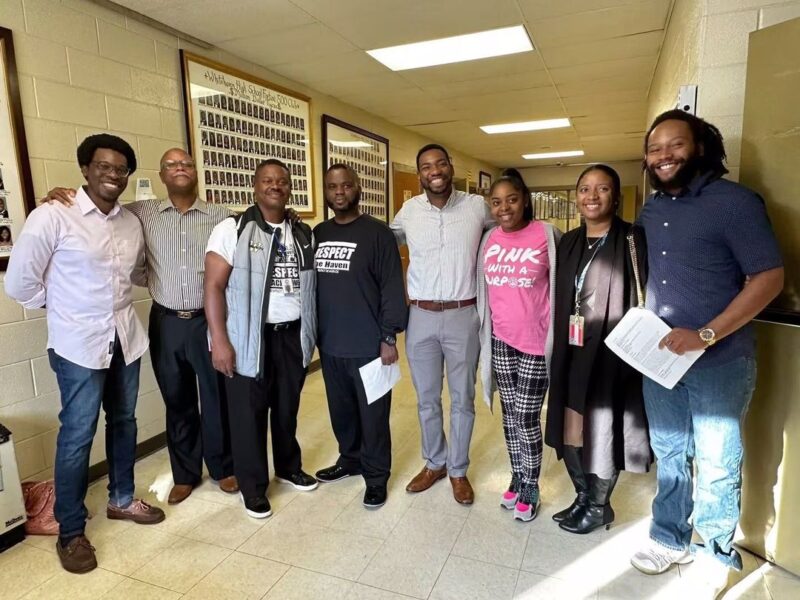
Pulitzer-Winning ‘George Floyd’ Called Too ‘Adult’
“Students at Memphis’ Whitehaven High School got a chance last month to hear from journalists Robert Samuels and Toluse Olorunnipa, authors of the Pulitzer Prize-winning book on George Floyd — his life, his brutal killing by police in 2020, and its aftermath,” Laura Testino reported Tuesday for Chalkbeat Tennessee.
“But the students didn’t get to hear any excerpts from ‘His Name Is George Floyd,’ and they weren’t allowed to take home copies of the book from school. The authors had to give their presentation without going too deep into the book’s main theme of systemic racism.
“Who determined the restrictions and why is unclear. The organizers of the event, a local partnership called Memphis Reads, said their instructions to the authors were based on guidance from the school district on complying with Tennessee law that requires that books used in school be ‘age appropriate.’ “
“ALA [American Library Association] spokesperson Raymond Garcia told Chalkbeat that the group ‘does not rate books’ for age appropriateness.
“Booklist, a book review magazine published by the ALA — and listed among resources for librarians in an MSCS manual — uses its ‘adult’ label not to be restrictive but to signal that a book would be of interest primarily to adults, Garcia said.
“ ‘His Name is George Floyd’ is also categorized as ‘nonfiction’ and ‘social sciences.’
“If the label was a factor in the decision not to allow Memphis Reads to distribute the books at Whitehaven, then that’s an ‘inaccurate understanding’ of the purpose of such book labels, said Deborah Caldwell-Stone, the director of the Office for Intellectual Freedom at the American Library Association.
Testino continued, “In the end, the authors told Chalkbeat, the students who gathered at Whitehaven that day were shortchanged by restricted access to the book and a censored experience. . . .
“MSCS officials and the Memphis Reads organizers did not specifically cite this law as a factor in what ultimately happened at Whitehaven, but the law nonetheless hangs over educators’ decisions about what topics are appropriate for classroom discussion. Two Memphis teachers are among five in Tennessee challenging the law in federal court. . . .”
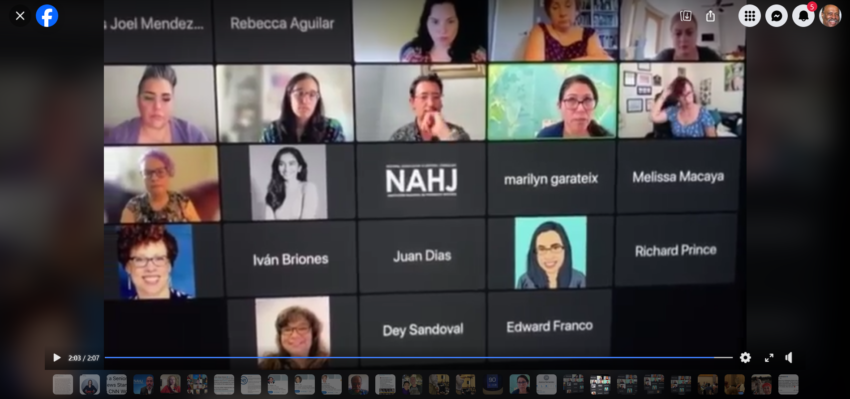
NAHJ Nets $480,000 From Summer Convention
The National Association of Hispanic Journalists netted $480,000 from its summer convention in Miami — it was “a great conference,” NAHJ chief operating officer Yaneth Guillen Diaz told the board at a meeting Saturday, but Financial Officer Geraldine Cols Azócar said the association is falling behind budget projections because, “We didn’t get as many grants as we originally planned.” She also cited the mid-year departure of Executive Director David Peña.
The association is searching for a successor.
Still, Cols Azocar emphasized, “This does not mean that NAHJ is in the red.” The association is in “one of the best financial positions we’ve had in years.”
Guillen Diaz said the organization had 3,647 active paid members, of which 1,000 are student members. It has 23 professional active chapters, and at the meeting, approved four new student chapters: at the University of Missouri, George Washington University, the University of Arkansas and the University of Miami School of Communciation.
NAHJ is pressing ahead with plans for its 40th anniversary convention in Hollywood, Calif., July 9–13.

The conference was originally to be a joint convention in Chicago with the National Association of Black Journalists, but NAHJ pulled out, saying it wanted to have a separate convention for its anniversary.
NAHJ signed a contract to locate its 2024 convention in Hollywood even though an NAHJ agreement with a Chicago venue for 2024 was still in force, Drew Berry, executive director of NABJ, said Aug. 2.
That would mean the Hispanic group increased its financial liability by pulling out of the joint conference.
Former NAHJ executive director Alberto B. Mendoza told Journal-isms, “I don’t remember exactly when things were signed, but we [visited] Chicago to see various hotels, selected one and up until I left NAHJ and NABJ were planning a 4th joint convention in Chicago in 2024.”
However, at NAHJ’s own board meeting Aug. 5, President Yvette Cabrera said, “We did not sign that initial contract with Chicago, and so the financial liabilities we believe will be minimal, and those are the things that we are discussing right now with the hotel.”
Since then, NABJ, NAHJ and the Chicago Hilton have declined to comment on the status of negotiations.
Cabrera said at the August meeting, “Some of that information has leaked out, that is not something that we would have — that we support. We strongly believe that these conversations need to happen with NABJ and the hotel directly. But we did not sign that initial contract with Chicago, and so the financial liabilities we believe will be minimal, and those are the things that we are discussing right now with the hotel. But we would not be doing this if it was not in the best interests of NAHJ. Ultimately, at the end of the day, as a board, we want a fair and equitable process and conference because we do know that our members love and support our joint conferences.
“It does not mean we’re not going to have one in the future, we very well could be. There’s a lot of work happening behind the scenes, like with our chapters, our investigative task force, in conjunction with NABJ members. That work continues. Even if we don’t have this conference together, as we’ve stated in the press release that we’ve put out, recently, the two organizations will continue to work together in the ways that we can.
“Meanwhile, we will work diligently behind the scenes to try to resolve this in the best interests of the organization financially. So even though I can’t share those details with you now, we do want the members to understand that we are — that that is top of mind for us as a board to do what’s best for the organization financially.”
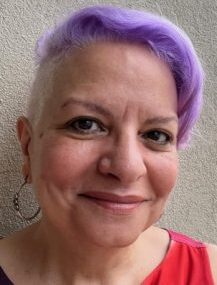 Joanna Hernandez (pictured), an NAHJ member who raised the question with Cabrera, told Journal-isms afterward that she was not satisfied with the answer.
Joanna Hernandez (pictured), an NAHJ member who raised the question with Cabrera, told Journal-isms afterward that she was not satisfied with the answer.
“I attended Saturday’s board meeting to get answers about the decision the board made recently concerning the NABJ/NAHJ Chicago conference, but to be honest, I left with more questions,” she messaged.
“I contacted the board early last year concerning the conference in Florida [after government anti-diversity and anti-LGBTQ actions], and I was told that breaking the Miami venue contract would financially harm NAHJ. Yet, we are backing out of the joint conference contract with NABJ in Chicago. What’s the difference? And what’s the financial hit? The president did not give a concrete answer when I asked.
“Also, the Miami venue needed to be bigger to accommodate all the NAHJ members who wanted to attend. The small size of the Miami venue caused NAHJ to close registration weeks before the conference began. Members were left frustrated and upset. Yet, we learned at Saturday’s board meeting that the Los Angeles venue is no bigger and, most likely, registration is closing early next year, too. Once again, we will keep members out, lose money in registration and leave members frustrated.
“NAHJ’s members deserve to know the truth about the financial backlash our organization will experience from the leadership’s decision to back out of the joint conference with NABJ and the Chicago venue where capacity would not be an issue. The board needs to be transparent on why it signed a contract with a hotel that cannot accommodate our large membership.
“It is great to celebrate the organization’s 40th anniversary. But is it financially prudent now?
“As a former president of a journalism organization (UNITY), I understand that this NAHJ board had and has tough decisions to make. Still, all I ask is to be open and honest with our membership every step of the way.”
Short Takes
- “CNN senior media reporter Oliver Darcy accused NBC News of ‘helping to elevate and normalize’ two ‘far-right outlets’ by hosting Wednesday’s Republican presidential debate, which was partnered with alternative video platform Rumble and the conservative Salem Radio,” Charlie Nash wrote Thursday for Mediaite. “In CNN’s Reliable Sources newsletter, Darcy wrote, ‘Respected news organizations typically do not partner with right-wing companies known for trafficking in extremism. But NBC News chose another path.’ Darcy argued that NBC News’ decision to host the debate in partnership with Rumble and Salem Radio — companies which were selected by the Republican National Committee (RNC) — helped ‘elevate and normalize both of the far-right outfits.’ . . . ”
- Donald “Trump has recently vowed to implement ‘ideological screening’ for migrants, saying he’d turn away anyone who doesn’t like ‘our religion’; accused ‘liberal Jews’ of voting ‘to destroy America & Israel’; claimed migrants are ‘poisoning the blood of our country’; and complimented the terrorist group Hezbollah as ‘very smart,‘ ” Harrison Ray reported for Media Matters for America. “Yet these extreme and alarming statements received scant coverage across major TV news networks: Three of the four comments received no more than 22 minutes of attention each, with only one nearing an hour. In total, across major broadcast and cable news outlets in the two weeks after each comment occurred, the four comments together received less than 2 hours of coverage combined. . . .”
- “By the end of the century, the U.S. population will be declining without substantial immigration, older adults will outnumber children and white, non- Hispanic residents will account for less than 50% of the population, according to projections released Thursday by the U.S. Census Bureau,” Mike Schneider wrote Thursday for the Associated Press. “The population projections offer a glimpse of what the nation may look like at the turn of the next century, though a forecast decades into the future can’t predict the unexpected like a global pandemic.”

- “Former TV news reporter Lily Wu (pictured) won her initial bid for public office Tuesday, defeating incumbent Wichita mayor Brandon Whipple in a general election marked by Wu’s record-setting campaign contributions,” Kirk Seminoff wrote Tuesday for the Wichita (Kan.) Business Journal. “Wu won with 58% of the vote to Whipple’s 41.3% in final unofficial results released by the Sedgwick County Election Office. A Nov. 16 canvass of votes will certify the election.” Wu was an anchor and reporter at KWCH-TV from June 2020 until this past March, and a reporter at KAKE-TV from 2010 to 2019. Both stations are in Wichita.
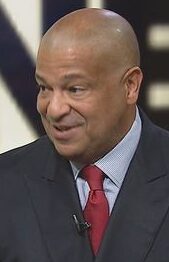 “Urban One’s second shot at its much-desired Richmond, VA casino has failed,” Radio Ink reported Thursday. “As some wonder if the company’s casino plans are sunk, Urban One CEO Alfred Liggins (pictured) has already revealed his contingency plan, including a likely city just 23 minutes from the originally planned site. The second referendum on the Richmond Grand Resort & Casino saw a decisive outcome, with 61% of voters rejecting the $562 million proposal – a vast increase from the 51% against in 2021. . . . When asked by Richmond Times-Dispatch Editor Chris Coates about a potential failed vote in October, Liggins was frank: ‘This project will go somewhere else.’ Where? The nearby town of Petersburg is the most likely candidate, name-dropped by Liggins in the interview.’ . . .”
“Urban One’s second shot at its much-desired Richmond, VA casino has failed,” Radio Ink reported Thursday. “As some wonder if the company’s casino plans are sunk, Urban One CEO Alfred Liggins (pictured) has already revealed his contingency plan, including a likely city just 23 minutes from the originally planned site. The second referendum on the Richmond Grand Resort & Casino saw a decisive outcome, with 61% of voters rejecting the $562 million proposal – a vast increase from the 51% against in 2021. . . . When asked by Richmond Times-Dispatch Editor Chris Coates about a potential failed vote in October, Liggins was frank: ‘This project will go somewhere else.’ Where? The nearby town of Petersburg is the most likely candidate, name-dropped by Liggins in the interview.’ . . .”
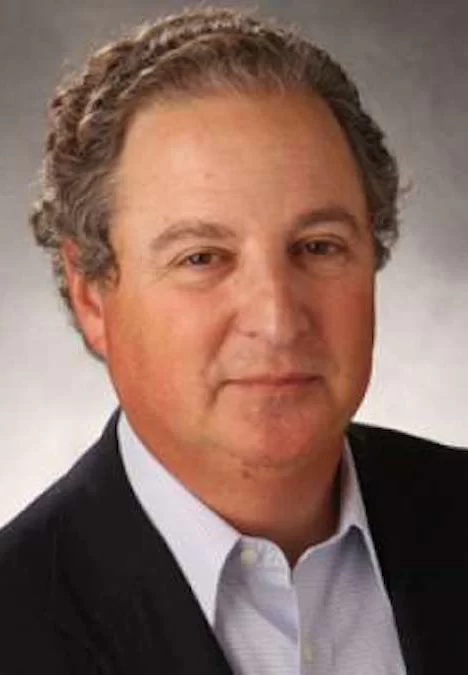 Merrill Brown (pictured), the G/O Media editorial director who in June chose Tatsha Robertson as editor of The Root, is departing the company, Benjamin Mullin, Johnny Diaz and Amanda Holpuch reported Thursday for The New York Times. Jim Spanfeller, the chief executive of G/O Media, announced it was shutting down the Jezebel site and laying off 23 people, including the Jezebel team. Brown was hired in January to supervise the G/O Media websites, which also include Gizmodo and Deadspin. He told Journal-isms Sunday he was “Taking a deep breath. Looking at consulting opportunities and reflecting for a few days on the challenging state of things.”
Merrill Brown (pictured), the G/O Media editorial director who in June chose Tatsha Robertson as editor of The Root, is departing the company, Benjamin Mullin, Johnny Diaz and Amanda Holpuch reported Thursday for The New York Times. Jim Spanfeller, the chief executive of G/O Media, announced it was shutting down the Jezebel site and laying off 23 people, including the Jezebel team. Brown was hired in January to supervise the G/O Media websites, which also include Gizmodo and Deadspin. He told Journal-isms Sunday he was “Taking a deep breath. Looking at consulting opportunities and reflecting for a few days on the challenging state of things.”

- “Last week, a God-loving man — and public figure — chose to end his life two days after 1819 News published photos of him wearing women’s clothing and makeup,” Roy S. Johnson wrote Wednesday for al.com. Johnson was one of at least three columnists of color — Renee Graham of the Boston Globe and LZ Granderson of the Los Angeles Times are others — to say it was wrong to “out” F.L. “Bubba” Copeland, mayor of Smiths Station and pastor at First Baptist Church in Phenix City, Ala. Johnson recalled that he did not disclose that the late tennis great Arthur Ashe,, a friend as well as a source, had contracted AIDS in 1988. “It wasn’t tough because I chose humanity and empathy over exclusive. I chose compassion and concern over journalistic competition.”
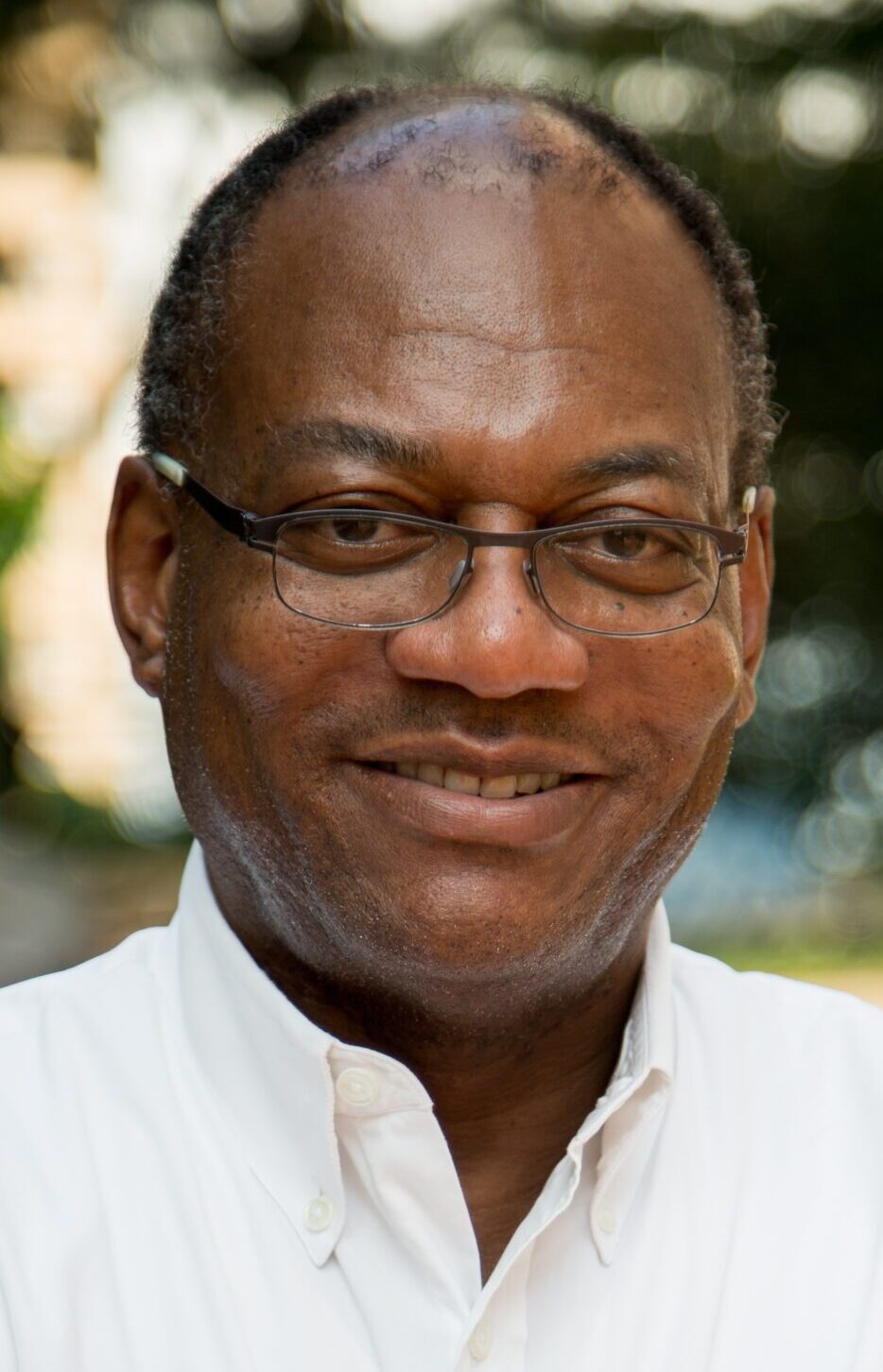 When the news broke in February that Jonathan Capehart had left the Washington Post editorial board, Axios headlined, “Jonathan Capehart quits WaPo editorial board, leaving no people of color.” However, Keith Richburg (pictured), a former Post foreign correspondent and editor, quietly joined the board in the spring, Richburg confirmed. He had most recently been a contributing columnist writing on Asia, Europe and Africa; and is at Princeton University as a visiting lecturer in the Humanities Council and Ferris Professor of Journalism.
When the news broke in February that Jonathan Capehart had left the Washington Post editorial board, Axios headlined, “Jonathan Capehart quits WaPo editorial board, leaving no people of color.” However, Keith Richburg (pictured), a former Post foreign correspondent and editor, quietly joined the board in the spring, Richburg confirmed. He had most recently been a contributing columnist writing on Asia, Europe and Africa; and is at Princeton University as a visiting lecturer in the Humanities Council and Ferris Professor of Journalism.
- “There’s nothing new about news publishers lamenting about advertisers’ keyword blocklists and third-party verification firms flagging their content for not being brand-safe,” Sara Guaglione reported Tuesday for Digiday. “And over the years, Black-owned media companies have shared their concerns that those keyword blocklists discriminately harm their businesses. But according to recent conversations with half a dozen executives at Black-owned publishers, this issue hasn’t improved — even for their lifestyle content. The execs told Digiday anywhere from 15% to 37% of their traffic can get blocked at times, which can lead to underperforming campaigns. And because it takes time to explain and correct those issues with advertisers and agencies, by the time the issue is fixed the lost impressions can threaten their sales teams’ ability to resign clients. . . .”

- “The Dow Jones News Fund presented veteran journalist, industry leader and educator Loren Ghiglione the 2023 Richard J. Levine Journalism Champion Award at its annual board meeting on Nov. 3,” the fund announced. “The Journalism Champion Award was established in 2022 to honor those whose work supports and advances a strong and diverse free press. The award also pays tribute to the late News Fund president and longtime Dow Jones news executive Richard J. Levine and his contributions to journalism.”
- “Space explorers, hip-hop musicians, artists, and housing activists are among the diverse list of characters who make up season two of the PBS series ‘Native America’,” Native America Calling reports. “The four-part season builds on the original series from 2018. Native filmmakers guide viewers on an inspiring and poignant exploration of modern Native life and its connection to traditions and stories from time immemorial.”
- The Indigenous Journalists Association Wednesday announced a three-year strategic plan with four goals: Expand membership structure to support continued growth; elevate standards and accountability in Indigenous journalism; establish IJA as leading voice in journalism and review and revise governing documents.
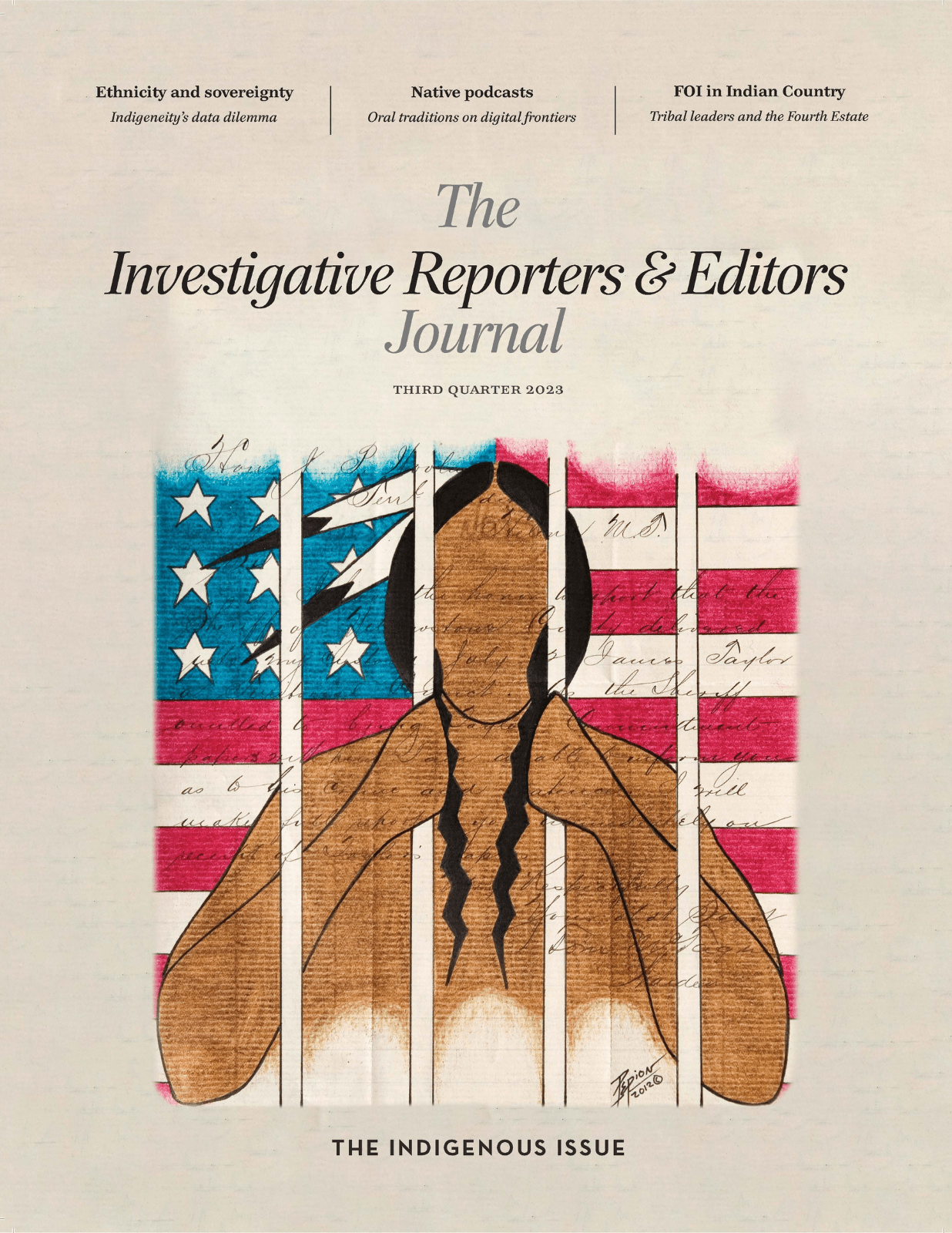 “Members of the Indigenous Journalists Association (IJA) contributed to the recently published Investigative Reporters & Editors (IRE) Journal,” IJA announces. “A special free edition of the magazine titled The Indigenous Issue, features articles written by current IJA President Christine Trudeau, Vice President Jourdan Bennett-Begaye, and board members, alongside members and past presidents. . . .”
“Members of the Indigenous Journalists Association (IJA) contributed to the recently published Investigative Reporters & Editors (IRE) Journal,” IJA announces. “A special free edition of the magazine titled The Indigenous Issue, features articles written by current IJA President Christine Trudeau, Vice President Jourdan Bennett-Begaye, and board members, alongside members and past presidents. . . .”
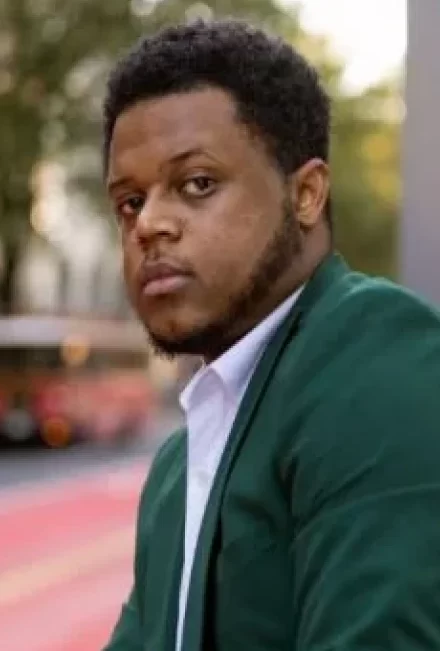 Next City, “a nonprofit news organization covering solutions for just and equitable cities,” is pleased to welcome Barry Greene, Jr. (pictured) as our Equitable Cities Reporting Fellow for Reparations Narratives,” Virginia Public Media announced. Greene will join Next City “for a one-year reporting fellowship based in Richmond, Virginia, in a multi-platform journalism partnership with the local NPR affiliate, VPM News. . . .”
Next City, “a nonprofit news organization covering solutions for just and equitable cities,” is pleased to welcome Barry Greene, Jr. (pictured) as our Equitable Cities Reporting Fellow for Reparations Narratives,” Virginia Public Media announced. Greene will join Next City “for a one-year reporting fellowship based in Richmond, Virginia, in a multi-platform journalism partnership with the local NPR affiliate, VPM News. . . .”
- “Alexis Rogers (pictured) has joined NBC station KARE-TV Ch. 11 in Minneapolis as an anchor and community relations manager. Recently, she was an evening anchor and co-host at WISH-TV Ch. 8, a CW affiliate in Indianapolis,” Talking Biz News reported Wednesday.
- Tom Davidson, who consults for news organizations and teaches about nonprofit news and public media at the University of Maryland, makes a case that public media should be included in Press Forward, the $500 million philanthropic effort to fund local news. For Current, Davidson outlines three steps that “align with what Press Forward’s leaders say they want — and just might lead to future funding. Pitches like ‘Help me grow my four-reporter newsroom to five!’ stand no chance. . . .”
- “The Hawaii Herald — ‘Hawaii’s Japanese-American Journal in English’ — has been around for 43 years, sharing and perpetuating Japanese-American history and culture. It’s published twice a month, but the last issue will be Dec. 1,” Mahealani Richardson reported Nov. 2 for Hawaii News Now. Richardson also wrote, “About 10 people work for The Hawaii Herald and its sister Japanese language newspaper, Hawaii Hochi, which was established 111 years ago and printed daily. Hawaii News Now has learned it, too, is expected to shut down in December, but there’s been no official announcement yet from management. . . .”

- “On Sunday 5 November, radio anchor Juan Jumalon (pictured), also known as DJ Johnny Walker, was gunned down in the municipality of Calamba, in the southern region of Mindanao” in the Philippines, Reporters Without Borders reported Monday. “The journalist, aged 57, was broadcasting a live show on Facebook for the media 94.7 Gold FM when a gunman entered his place, shot him twice in the head, and grabbed his necklace before fleeing with an accomplice. Operating from a studio set up in his home, Jumalon mainly covered current affairs in Mindanao. While the motive for the crime is currently unknown, the National Union of Journalists (NUJP) points out that many journalists in the region have recently received threats following their coverage of local elections held last month. . . .”
To subscribe at no cost, please send an email to journal-isms+subscribe@groups.io and say who you are.
Facebook users: “Like” “Richard Prince’s Journal-isms” on Facebook.
Follow Richard Prince on Twitter @princeeditor
Richard Prince’s Journal-isms originates from Washington. It began in print before most of us knew what the internet was, and it would like to be referred to as a “column.” Any views expressed in the column are those of the person or organization quoted and not those of any other entity. Send tips, comments and concerns to Richard Prince at journal-isms+owner@
View previous columns (after Feb. 13, 2016).
View previous columns (before Feb. 13, 2016)
- Diversity’s Greatest Hits, 2018 (Jan. 4, 2019)
- Book Notes: Is Taking a Knee Really All That? (Dec. 20, 2018)
- Book Notes: Challenging ’45’ and Proudly Telling the Story (Dec. 18, 2018)
- Book Notes: Get Down With the Legends! (Dec. 11, 2018)
- Journalist Richard Prince w/Joe Madison (Sirius XM, April 18, 2018) (podcast)
- Richard Prince (journalist) (Wikipedia entry)
- February 2018 Podcast: Richard “Dick” Prince on the need for newsroom diversity (Gabriel Greschler, Student Press Law Center, Feb. 26, 2018)
- Diversity’s Greatest Hits, 2017 — Where Will They Take Us in the Year Ahead?
- Book Notes: Best Sellers, Uncovered Treasures, Overlooked History (Dec. 19, 2017)
- An advocate for diversity in the media is still pressing for representation, (Courtland Milloy, Washington Post, Nov. 28, 2017)
- Morgan Global Journalism Review: Journal-isms Journeys On (Aug. 31, 2017)
- Diversity’s Greatest Hits, 2016
- Book Notes: 16 Writers Dish About ‘Chelle,’ the First Lady
- Book Notes: From Coretta to Barack, and in Search of the Godfather
- Journal-isms’ Richard Prince Wants Your Ideas (FishbowlDC, Feb. 26, 2016)
- “JOURNAL-ISMS” IS LATEST TO BEAR BRUNT OF INDUSTRY’S ECONOMIC WOES (Feb. 19, 2016)
- Richard Prince with Charlayne Hunter-Gault, “PBS NewsHour,” “What stagnant diversity means for America’s newsrooms” (Dec. 15, 2015)
- Book Notes: Journalists Follow Their Passions
- Book Notes: Journalists Who Rocked Their World
- Book Notes: Hands Up! Read This!
- Book Notes: New Cosby Bio Looks Like a Best-Seller
- Journo-diversity advocate turns attention to Ezra Klein project (Erik Wemple, Washington Post, March 5, 2014)

